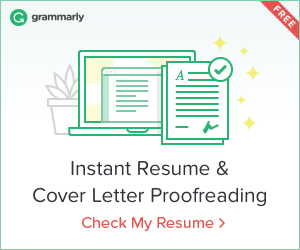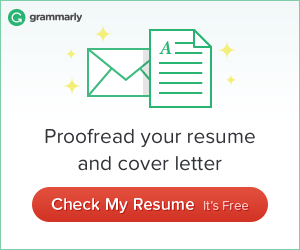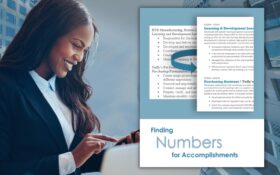
Whether you’re a fresh grad or a mid-level professional, you’re lucky if your resume gets even a quick skim read. Recruiters can only afford to budget mere seconds to read each resume they receive. This is why a results-oriented resume is a must-have for your career.
The process of boiling down your blood, sweat and tears into two pages is often overwhelming. The result? A resume that is tough to digest and that doesn’t convey how perfect you are for the role.
Coming up
So, I’m going to share 5 key questions that will help you quantify your achievements. These achievements will help you create the big-picture brochure that your resume needs to be.
Disclosure: We are affiliates for some of the products and services mentioned on this page. Learn more.
Vacations research and your results-oriented resume
Reading through resumes is like selecting a vacation property. Think about the last time you researched vacation options. Did you look for the number of hotel rooms available? The locations of the fire exits? Or menu items that were included in room service? I bet you didn’t
You probably looked at the big picture. Does the destination have the amenities you enjoy? Do the lodgings meet your standards? Is the resort in nice surroundings? If the print or digital brochure ticks the right boxes, you’re likely to make the resort a serious contender.
Vacation research is akin to resume reading. It’s the big picture, and not the fine print, that makes it worthy of serious thought after an initial review.
Transforming your resume into a results-oriented, big-picture brochure
Translating the big picture into a resume requires you to focus on results and achievements. This is easy if you work in sales. Particularly if your company tracks your numbers and you’ve had a great year!
Show your stats and rankings and voila! You have a results-oriented resume that shows the reader how you can help them.
It’s harder if you’re directing teams that span operations, marketing, HR or finance. You’ll need to dig deeper, as the results are often hidden in plain sight.
Quantifying the big picture when you’re not in a sales role
If your role isn’t revenue-focused, it doesn’t mean you don’t have quantifiable or measurable results. You just need to know where to look. A great place to begin is by asking yourself the right questions.
Below are 5 questions to get you started with your results-oriented resume
Get a pen and paper and write down the things that come to mind when asking these questions.
1. What am I proud of?
When you walk out the door, what you are most proud of? 9 times out of 10, a resume specialist will lead with this response.
Have you stopped your organization from losing money? Did you get the same amount done with fewer people or build a strong network across an organization? Have you developed your team to the point where they excel even in your absence?
These are all noteworthy achievements! They give the reader a sense of how you can make a difference in your next role. Your proudest moments will help you get started with your results-oriented resume
2. Did I save my company money?
Saving money is often as important as bringing it to the table.
Consider times when you negotiated discounts, identified discrepancies or improved processes. You can articulate these achievements by calculating the savings that you achieved.
List these savings in either dollar figures or percentages. A great place to do this is in the key achievements section of your resume.
3. Did I save time?
Saving time is a huge value-add to companies when it’s all about efficiency. Did you rework a process that used to take days and now takes hours? Did you introduce a new method or bring automation to a team or process that shaves hours off a task?
Spell these out to quantify the saving.
4. Are people happier because of me?
Low morale and falling retention rates are a problem for companies. Does your talent lie in transforming culture or retaining clients, customers or employees? If so, add it to your results-oriented resume, readers will take note
Quantify happiness by noting how many staff or customers you retained. Or look at satisfaction scores, if available, and see if there was a measurable uptick. Morale and customer satisfaction are quantifiable achievements that should be on your resume.
5. Did I contribute to improving my company’s circumstances?
It may be hard to determine the impact of your individual contribution to the company on a large scale. Take a look at your company’s growth (revenue, market share, associate) during your tenure.
Did your company survive where competition failed or did it stem the bleeding? Explain your part of the team effort that contributed to this achievement. Take credit where it’s due. This will show your role in the big picture.
Writing your results-oriented resume with a “brochure frame of mind”
These questions are a great way to get the creative juices flowing. Your aim is to create a resume that reads like a marketing brochure. To do that, remember to keep the big picture in mind. What does a reader want or need to see within the first few seconds?
Use a results-oriented resume template
There are resume templates available on Job Search Journey that will help you with this process. All of them are designed to aid you in creating your big-picture brochure. Click here to explore.
Use Jobscan
Jobscan will scan your resume and help you identify where you need to make improvements. The team at Jobscan understand the importance of a results-oriented resume. Their tools are designed to help your resume stand out in a crowded marketplace.
Try Jobscan here (ad)






